
Every year, the Indigenous Peoples and Development Branch within the Division for Inclusive Social Development of the Department of Economic and Social Affairs organizes an international expert group meeting (EGM) on a theme recommended by the Permanent Forum on Indigenous Issues and endorse by the Economic and Social Council (ECOSOC).
In its twenty-third session in 2024, the Permanent Forum recommended the theme of the EGM, "The Rights of Indigenous Peoples, including those in voluntary isolation and initial contact in the context of the extraction of critical minerals.
The EGM will be held virtually online between 2-4 December 2024.
Participation
Accredited Indigenous Peoples Organizations, Member States, United Nations agencies, programmes and funds, non-governmental organizations with ECOSOC status and academia are invited to participate.
Registration
Registration to the EGM has now closed.
Working Languages:
Interpretation in English, Spanish and Portugese and vice-versa will be available.
Documents
Concept note English | Spanish
Programme of work English | Spanish
Report AR | EN | ES | FR | RU | ZH
Objectives of the Expert Group Meeting
The overall objective of the Expert Group Meeting is to:
- Elaborate on Indigenous-led initiatives and enterprises that promote the development of Indigenous Peoples' land, territories and resources, offering alternatives for energy transition consistent with their self-determination and related rights;
- Analyze the principles of human rights due diligence vis-a-vis the need to obtain the free, prior and informed consent of Indigenous Peoples for extractive operations affecting them, however adhering to the precautionary, no-contact and intangibility principles in relation to Indigenous Peoples living in voluntary isolation and initial contact;
- Assess the situation of reprisals against Indigenous leaders and Indigenous human rights defenders, including Indigenous women, in relation to their activism in defending their rights;
- Examine access to effective remedy, or lack thereof, for Indigenous Peoples negatively affected by extractive industry activities;
- Share good practices on States' recognition and protection of as well as engagement of businesses and investors and works of various UN mechanisms for the rights of Indigenous Peoples; and
- Provide recommendations and next steps to ensure the respect for the rights of Indigenous Peoples.
The final report and recommendations of the EGM will be submitted to the Permanent Forum on Indigenous Issues at its twenty-fourth session in April 2025.
Themes for discussion
Day 1: Monday 2 December 2024 from 10:00- 12:30 EST
Theme 1: Territorial and land rights and cultural preservation towards strengthening Indigenous Peoples’ self-determination & free, prior and informed consent (FPIC).
- What legal and policy measures can States adopt to secure Indigenous territorial and land rights in areas targeted for critical mineral extraction?
- How can Indigenous Peoples balance economic opportunities from critical mineral extraction with the need for environmental protection and cultural preservation?
- What are the main challenges to implementing free, prior, and informed consent (FPIC) in the critical minerals sector, and how can these be addressed to ensure meaningful participation?
- How can Indigenous knowledge systems and cultural practices be incorporated into environmental protection and restoration projects in mining areas?
- What accountability mechanisms can be put in place to ensure that States and corporations adhere to FPIC and respect territorial rights in the critical minerals industry
- What strategies can be implemented to protect the territories of Indigenous Peoples in Isolation and Initial Contact, ensuring that their right to self-determination and FPIC are respected without forcing contact?
- How can cultural preservation be prioritized in legal and policy frameworks to safeguard the heritage and autonomy Indigenous Peoples in Isolation and Initial Contact, especially as external pressures on their territories increase?
Day 2: Tuesday 3 December 2024 from 15:00- 17:30 EST
Theme 2: Social, economic, health and environmental impact of critical mineral projects towards a just transition
- What policies and practices can ensure that critical mineral extraction benefits Indigenous Peoples economically without compromising social, environmental, and health standards?
- What are the potential health impacts of critical mineral projects and how can we assess and mitigate these long-term health impacts on Indigenous Peoples, particularly in remote areas?
- What frameworks exist to equitably share the economic benefits of critical mineral projects with Indigenous Peoples, and how can these be strengthened to ensure a just transition?
- How can States and corporations work with Indigenous Peoples to prevent environmental degradation and ensure sustainable land stewardship during and after mineral extraction?
- How can States and corporations work with Indigenous Peoples to prevent environmental degradation and ensure sustainable land stewardship during and after mineral extraction?
- How can States and corporations ensure the protection of Indigenous Peoples in Isolation and Initial Contact from the environmental and health impacts of critical mineral projects, especially regarding potential exposure to external populations and diseases?
- What safeguards and monitoring systems can be put in place to respect the autonomy and territories of Indigenous Peoples in Isolation and Initial Contact in areas affected by critical mineral extraction?
Day 3: Wednesday 4 December 2024 from 9:00- 11:30 EST
Theme 3: Pathways forward in advancing legal and regulatory responses to human rights violations affecting Indigenous Peoples in the context of critical minerals
- What legal reforms are most urgently needed to protect Indigenous rights in regions where critical mineral extraction takes place?
- How can States strengthen enforcement mechanisms to prevent and address human rights violations tied to critical mineral projects on Indigenous lands?
- Are there international legal frameworks that could be expanded or adapted to provide better protection for Indigenous rights in the context of critical minerals?
- What role can Indigenous-led legal initiatives play in shaping policies and regulations that safeguard their lands, resources, and rights?
- How can collaboration between Indigenous Peoples, States, and international organizations enhance accountability for corporations involved in critical mineral extraction?
- How can existing international human rights frameworks be adapted or strengthened to specifically protect the rights and territories of Indigenous Peoples in Isolation and Initial Contact near critical mineral deposits?
Papers submitted by Experts
The views expressed in these papers are those of the authors and do not necessarily represent those of the United Nations.
- Galina Angarova - Securing Indigenous Rights in the Energy Transition: Preventing Harm, Ensuring Consent, and Promoting Equity in Transition Minerals Extraction [EN]
- Manoela Pessoa de Miranda - Contribution from the Minamata Convention on Mercury to address human rights violations affecting Indigenous Peoples in the context of mercury use in gold mining [EN]
- Patricia Suarez - Minería de Transición y Pueblos Indígenas en Aislamiento de la Amazonía: una visión desde la autonomía, la intangibilidad y la justicia [ES]
- Valmaine Toki - Chairperson EMRIP [video address]
- Antenor Vaz - Pueblos Indígenas en Aislamiento y Contacto Inicial y la Extracción de Minerales Críticos en América del Sur [ES]
- Anthony Phillip Williams - Indigenous Peoples of Southern Africa Land Dispossession in the Critical Minerals Complex- Particular focus on the Northern Cape Province in South Africa [EN]
- Pichamon Yeophantong - Vice-Chair United Nations Working Group on Business and Human Rights- Upholding Indigenous Peoples' rights in the context of critical minerals extraction through the UN Guiding Principles on Business and Human Rights [EN]
Experts

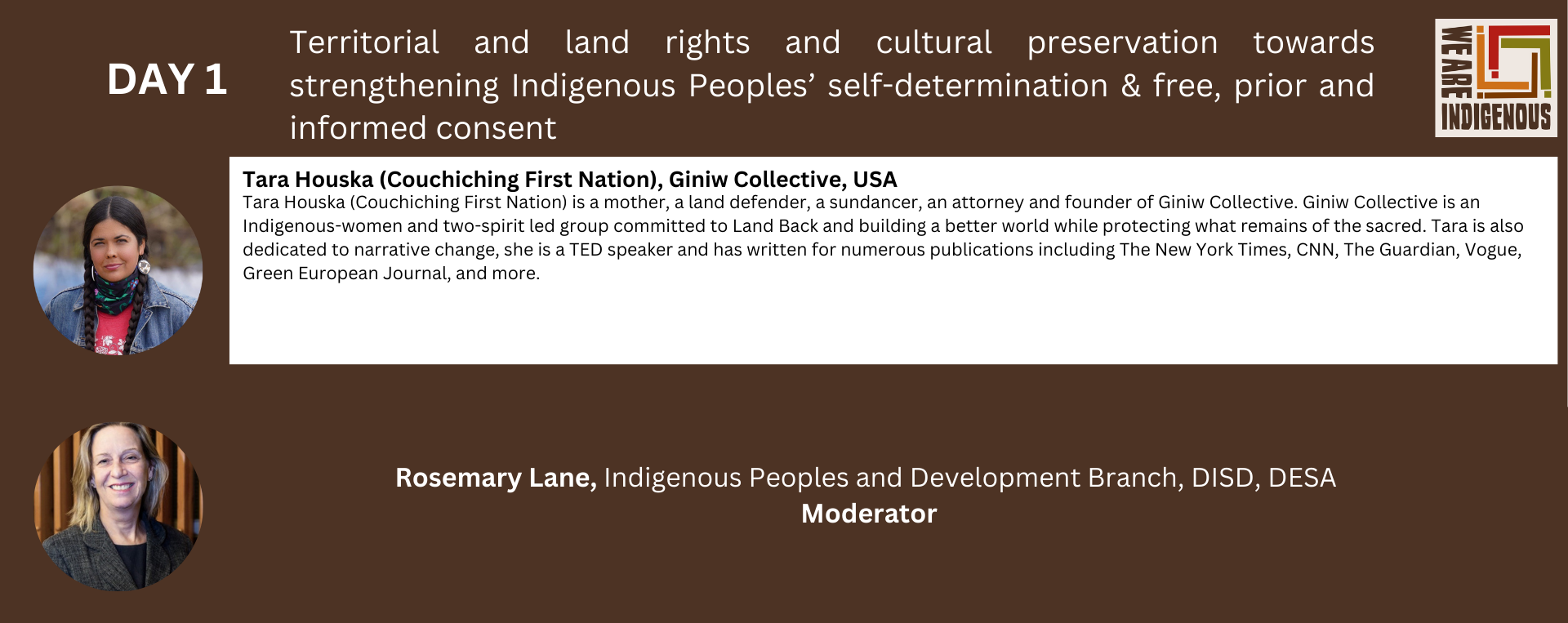
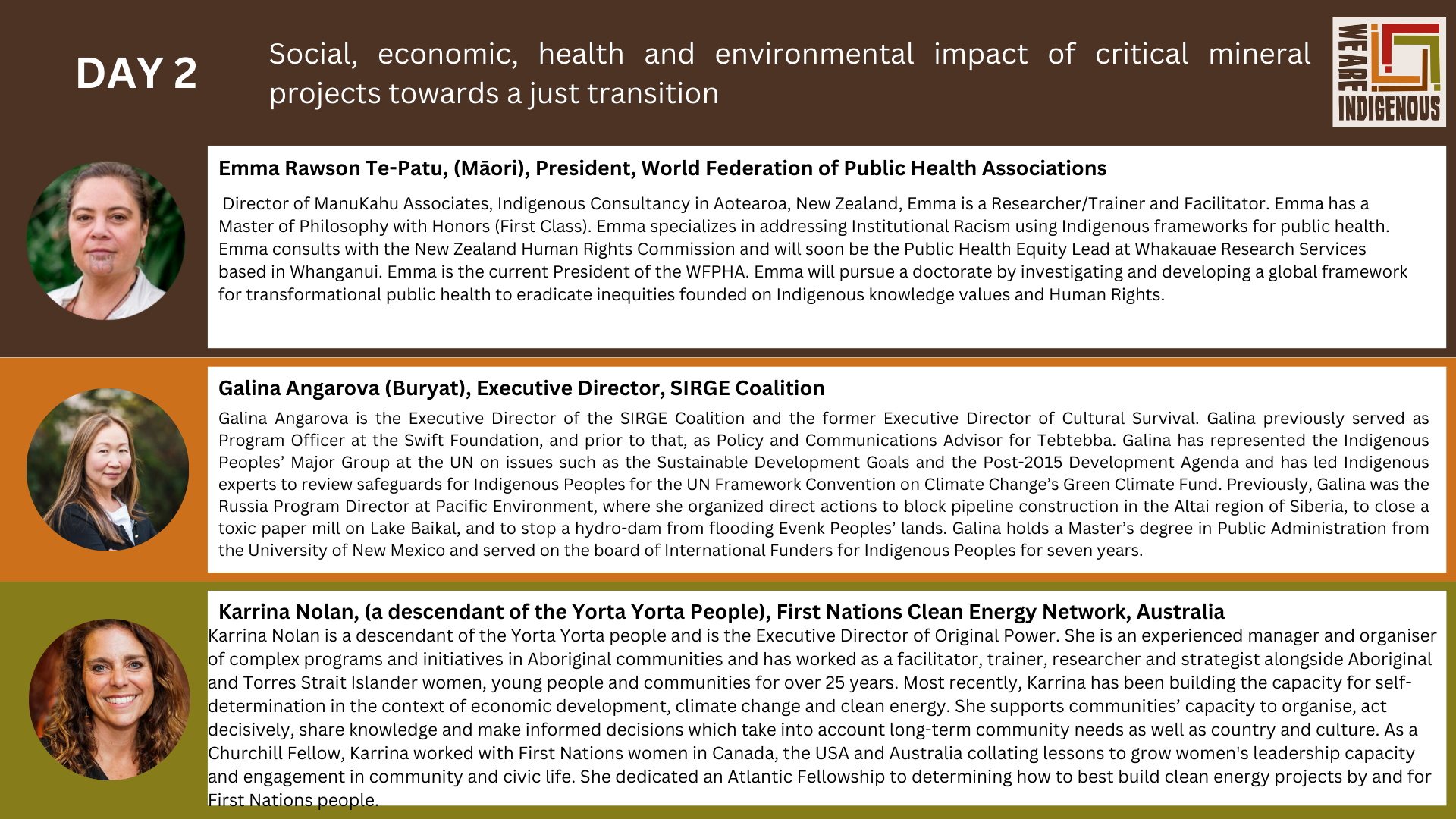
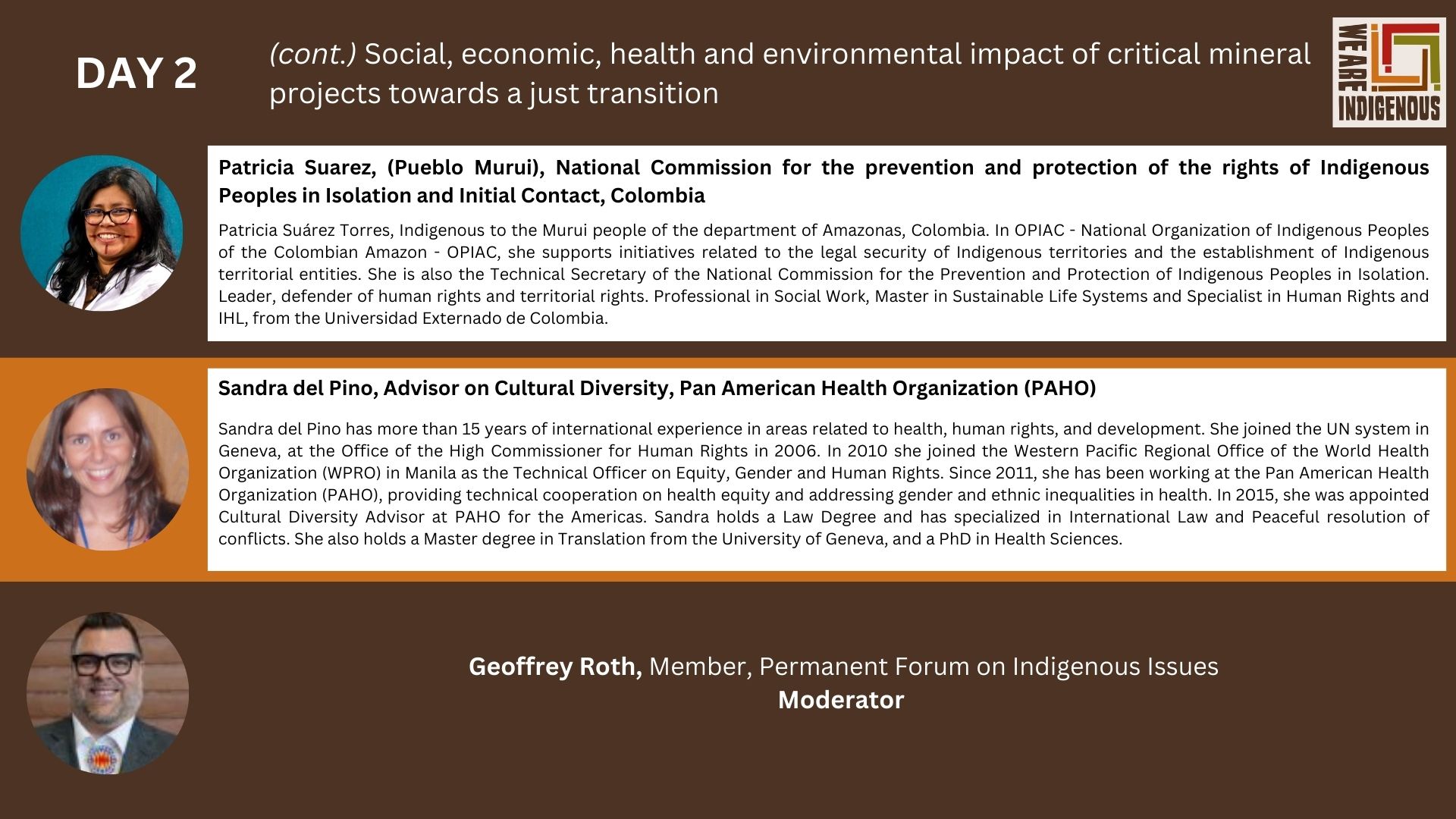
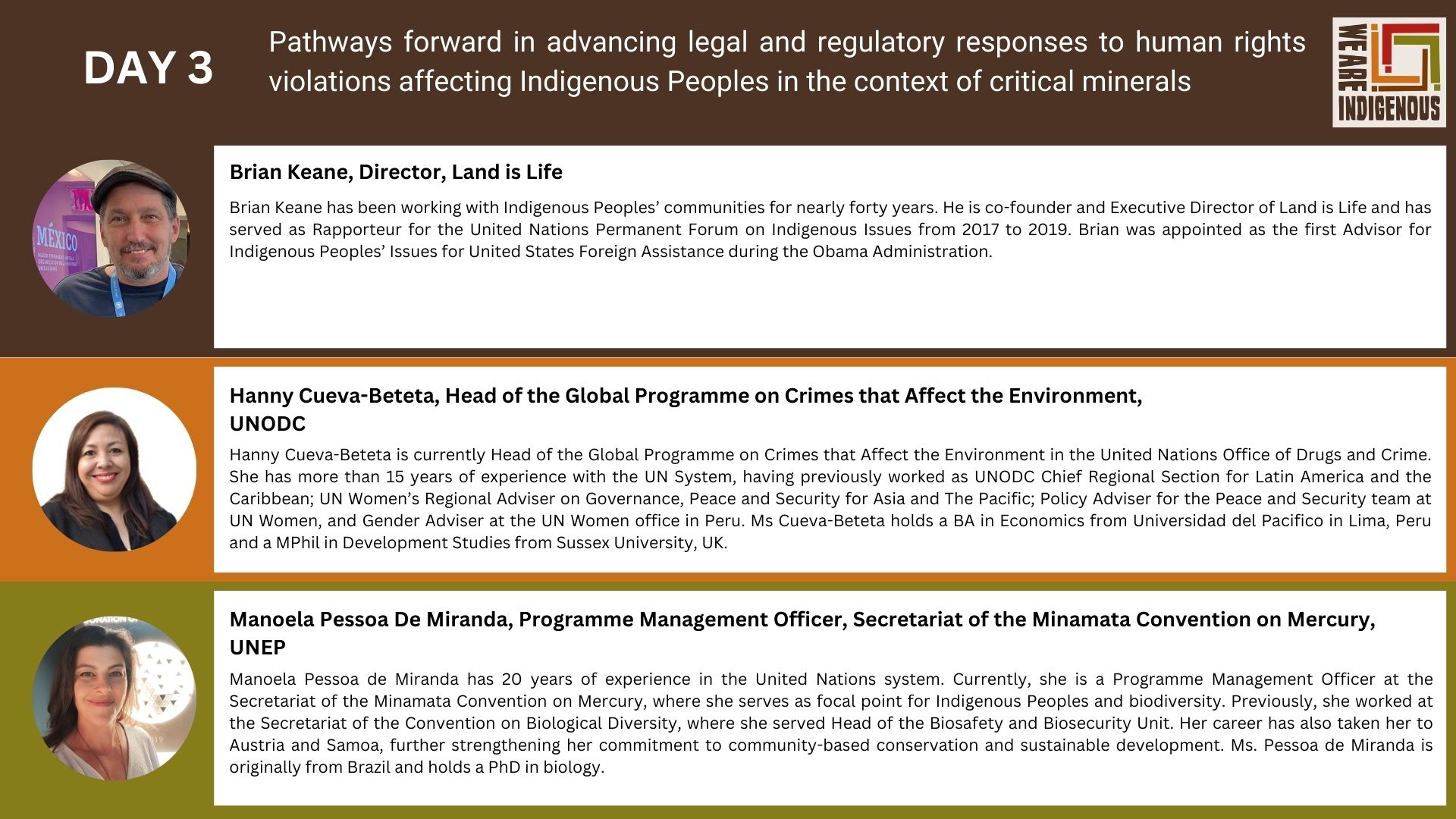
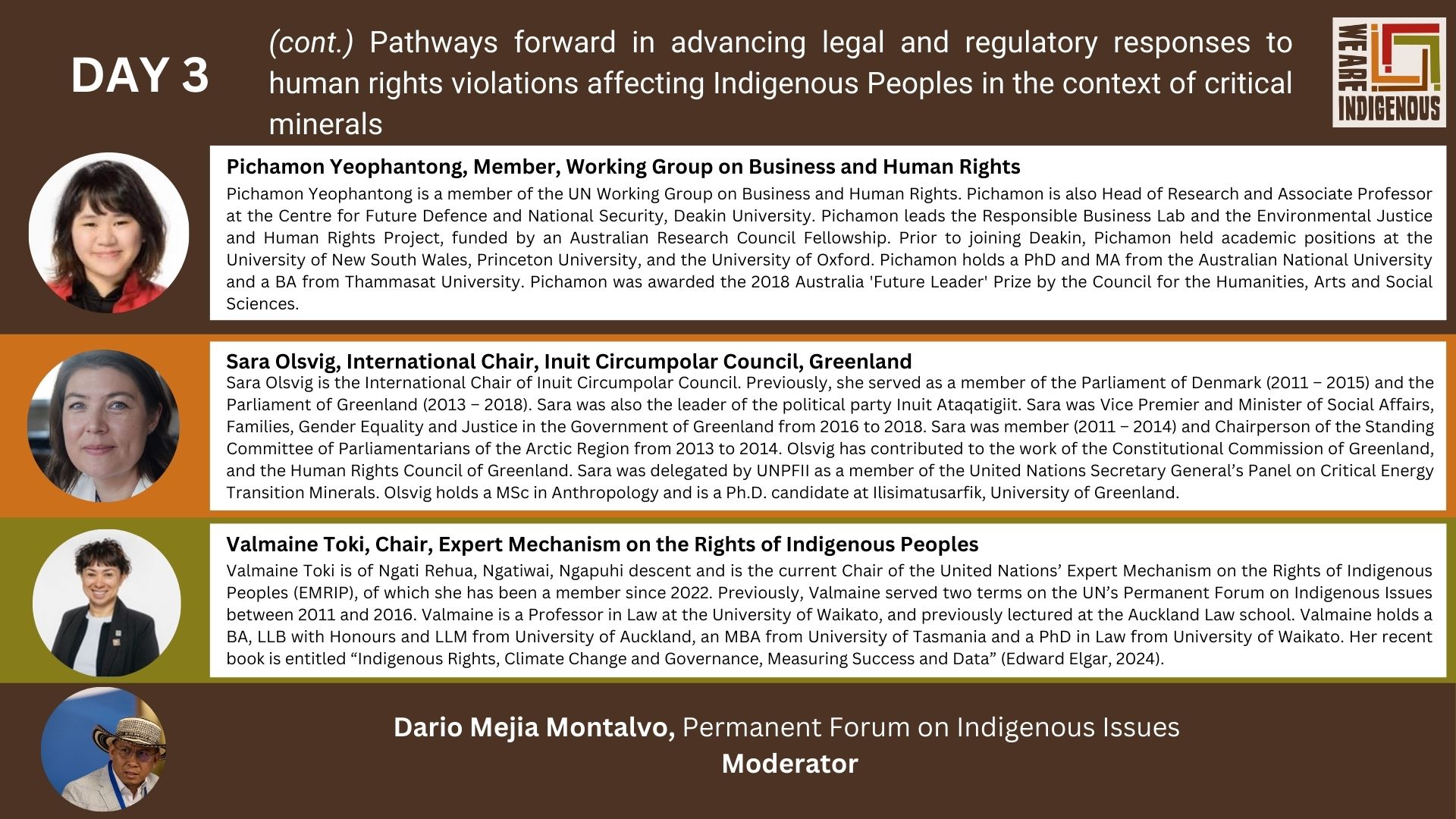
Resources
- The UN Secretary-General's Panel on Critical Energy Transition Minerals Report- "Resourcing the energy transition- principles to guide critical energy transition minerals towards equity and justice", 11 September 2024 [EN]
- “International Framework in the United Nations on the Rights of Indigenous Peoples” - Input paper by panel members Dario Mejia Montalvo and Sara Olsvig, appointed by the UN Permanent Forum on Indigenous Issues to the work of the UN Secretary-General’s panel in critical energy transition minerals [EN]
- Written contribution to the Panel on Critical Energy Transition Minerals - Prepared by panel members Dario Mejia Montalvo and Sara Olsvig, with input from members of UN Permanent Forum on Indigenous Issues and the UN Expert Mechanism on the Rights of Indigenous Peoples, 19 August 2024 [EN]
- United Nations Declaration on the Rights of Indigenous Peoples [AR] [EN] [ES] [FR] [RU] [ZH]
- The Minamata Convention on Mercury [EN]
- The Minamata Convention- Platform for Indigenous Peoples and for local communities [EN]
- United Nations Office on Drug Crimes [EN]
- United Nations Forum on Business and Human Rights [EN]
- United Nations Guiding Principles on Business and Human Rights [EN]
- International Labor Organization- Indigenous and Tribal Peoples Convention, 1989 (No. 169) [EN]
- "Principios y Directrices para la Atención a la Salud de los Pueblos Indígenas Aislados y en Contacto Inicial" - Organización del Tratado de Cooperación Amazónica (OTCA), 2021 [ES]
- "Marco Estratégico para la Protección de los Pueblos Indígenas en Aislamiento y en Contacto Inicial" - Organización del Tratado de Cooperación Amazónica (OTCA), 2021 [ES]
Contact Information
UN Department of Economic and Social Affairs, Division for Inclusive Social Development Indigenous Peoples and Development Branch, indigenous_un@un.org
 Welcome to the United Nations
Welcome to the United Nations